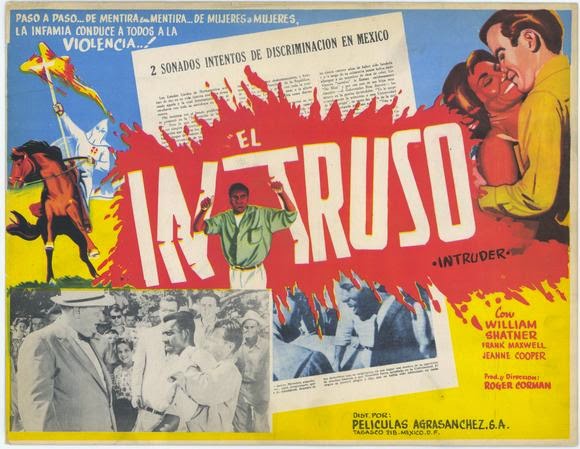Thursday, December 11, 2014
THE INTRUDER (Roger Corman, 1962, USA)
A stranger comes to Caxton to incite the townsfolk into a patriotic fever in order to protect their way of life from intruders. Roger Corman directs this volatile tale of desegregation in a fictitious Southern town with such brutal honesty that it seems more a contemporary document of racist propaganda than a pugilistic and dire fable.
The plot revolves around this white stranger in a white suite named Adam Cramer who steps of the bus and immediately begins to ingratiate himself with the locals. His smiling and friendly demeanor hides the demon beneath as he is in town to urge the locals into action against ten black children who are now allowed to seek competent education in the "white" school. But Adam doesn’t bring strange or foreign ideals; he unearths the racism and bigotry that is barely concealed and allows it to act in open defiance of Federal Law. Though Adam doesn’t openly encourage lynching or murder he is late in realizing that the mob mentality is beyond his control.
Director Roger Corman tells a taught story with little focus on melodrama. Though Adam seduces the lonely wife of a salesman it is not portrayed as merely exploitive; this actually becomes an important element in the plot as it reveals Adam’s inherent weakness and limited judgment. Corman does not censor or downplay the racist venom spewed from the mouths of Adam and the locals and it becomes very uncomfortable to hear the "N" word used to humiliate and degrade people. In one scene, after Adam rouses the crowd towards violence the mob stops an innocent black family who were just driving down the main street. The crowd screams hatred and epithets towards this man as his wife begs him to keep silent while the children cry in the back seat. This poor man is urged towards a violent reaction so the crowd can then tear him apart. The violence is allayed by Tom McDaniel the Editor of the local paper whose racism has already been measured in moderation. But when the Sherriff shows up we see that not all people have access to the same Rule of Law.
Corman doesn’t show the black characters as victims even though the story is told mainly from Cramer and McDaniel’s perspectives. In one scene Corman follows one of the black students into his home and we see a normal family dynamic. In an almost Documentary style Corman takes the camera into the Slum section depicting people living their lives on the outskirts of middle-class Caxton. He shoots in a POV style in a continuous and fluid motion as Adam takes a taxi from his Hotel in town to the "Black" section. It is shocking to see the town deteriorate block by block until Adam arrives at his destination. Without comment, Corman has just made his Mission Statement for THE INTRUDER. There is no self-righteous preaching from any white character to uphold the black's Civil Rights which always seems to diminish their importance, as if black people just aren’t smart enough to stand up for themselves. To me, that’s one of the faults of TO KILL A MOCKIKINGBIRD. But Corman is concerned with moderate racists and shows McDaniel’s transformation from bigot towards an attitude of equality. In a powerful sequence McDaniel speaks with the children’s families and urges them not to give up and return to school the following day. He then walks to school with the children in a showing of solidarity against the white malignant hate mongers…which are his own friends and cohorts. He isn't speaking for the children, he's supporting them. Suddenly, McDaniel finds himself on the "outside" and is assaulted for his convictions.
Corman loses focus with the weak ending but the build-up is superb. After McDaniel’s young daughter is convinced by Cramer to accuse one of the black boys of Rape, a mob ensues that is only lacking in pitchforks and torches. We see realistic attitudes and responses from the school Principal and staff who try to protect the black student from the gathering crowd and are yet torn between the peer pressures of releasing him. Adam urges the crowd into a frenzy (actually, they don’t need much urging) and soon things get out-of-hand. The boy chooses to face his accusers (it’s his Constitutional Right after all) but this is no Court of Law. He is slapped and humiliated but doesn’t descend to their animalistic level. It is a brutal scene and one that makes you mad and keeps you on the edge of your seat at the injustice. The boy shows restraint which proves that he is growing into a manhood that these racist cowards will never attain! The group grabs the boy and ties him standing to a swing and pushes him back and forth…a lynching is only moments away. But the girl and the sympathetic salesman stop the assault as she confesses her part in the false accusation. The crowd hangs their collective heads in shame and disperses even as Adam tries to gain their affections once again.
This shallow ending of self-actualization rings like a broken bell and wraps things up too tightly, unsupported by the film’s Mission Statement. Not only do the locals seem to quickly feel shame over what they’ve done (and berated by another Outsider – the Salesman- no less) they do so without accountability which is the real problem with the film’s conclusion: without being held responsible for one’s actions there can be no Justice.
Final Grade: (B+)

